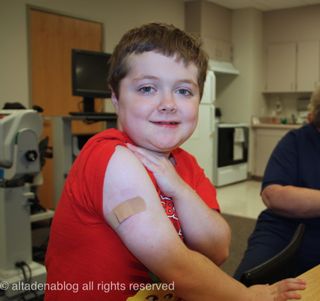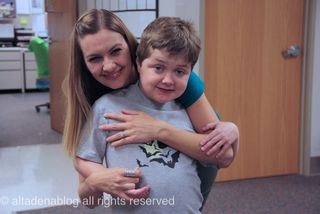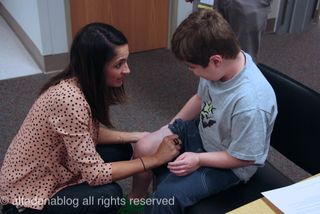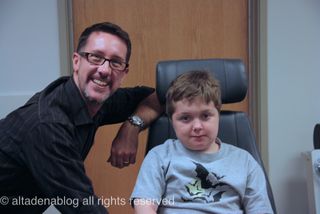Being a test subject can be a small boy's biggest adventure
by Timothy Rutt
We don’t like to make too big a deal about our family. Every family, even the most normal-appearing, has crosses to carry and burdens to bear.
But some folks say we’re bearing more than most, and that may be true. For instance, there's our younger daughter Rosie, who has Down Syndrome. To her advantage, she’s high-functioning, as well as cute and affectionate, and is the star of the family show (we’ve written about her here and here).
Our son, Jake, 10, is a little more complex. He’s handsome, certainly, and charming when he wants to be, but he strikes darker notes than Rosie. He’s not uniformly sunny; he’s the one who gets lost in the shadows under Rosie’s bright star. He’s more brooding, feels things more deeply -- he’s a maelstrom of emotions that he sometimes can’t control.
Jacob, like Rosie, also was not a winner in the genetic lottery. Jacob couldn’t walk until he was two and a half, and our trips to the various medical specialists eventually yielded a diagnosis of Duchenne muscular dystrophy.
Life with Duchenne
Duchenne affects about one in every 3,500 boys (and it is almost entirely boys who have it). It’s nasty business -- when young, the naked Duchenne boy looks almost Herculean with his large, well-formed muscles, but that’s an illusion -- that’s fatty tissue and scar tissue, because his body is at war with itself -- those muscles don’t do much. The general prognosis in the past has been wheelchair at age 10, vent at age 20, and after that, well ...
The culprit is down in the genes -- missing exons, small bits of genetic matter, that throw the DNA helix off and interfere with the creation of dystrophin, which is necessary for muscles to develop normally.
There’s been a lot of progress lately, fortunately: boys with Duchenne are more mobile and longer-lived than ever. Jacob has been taking steroids for many years, which slows the progress of the condition although he pays for it by being a head smaller than his peers. He also has to take a drug usually given to old ladies with brittle bones to counteract the effects the steroids have on his skeleton. But there’s a lot of research going on, in this country and in Europe, that we hope will result in drugs to give him something closer to a normal life.
Once a year, he is evaluated at Cincinnati Children’s Hospital, which is one of the two best Duchenne clinics in the country. Through that, he was identified as a potential test subject for new drugs under development.
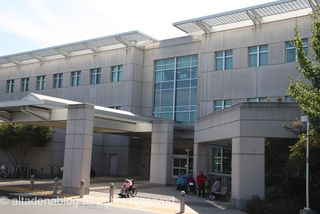
And that’s where our adventure began. The pharmaceutical company GlaxoSmithKline was testing a new drug for Duchenne muscular dystrophy patients with the same skipped exon that Jake has. We were contacted, and spent several weeks going through evaluations to determine if Jake met the study’s criteria. These evaluations meant flying to the UC-Davis School of Medicine in Sacramento, where the study was to take place.
He took various physical tests, including a six minute walking test that is a standard for the field. He gave copious amounts of blood and urine. He was weighed, measured, MRI’ed, and ultrasounded.
In April, Jake was admitted to the study group, but we had one final thing to give: the doctors would perform a muscle biopsy, taking an inch of muscle tissue in his leg before the drugs went in. That tissue would be frozen to compare to later samples to be taken after testing was complete.
On that visit, as we were heading home with Jake in a wheelchair and leg wrapped with surgical packing, he got pulled out of the line by TSA for special inspection (that story is here).
Jet setting
And, shortly thereafter, the study began. The routine was: every Friday, take the 9 AM flight out of Burbank, get to the clinic in Sacramento by 11 AM, get two shots, then go to the airport and take the 2:55 back to Burbank.
I have to confess: it was exciting to be hopping a plane every week on Glaxo’s dime and take a taxi to the medical center. What also helped is that we were going to see what is possible the most stunningly attractive clinical research team in the world: research coordinator Erica Goude, kinesiologist Alina Nicorici, clinical research coordinator Evan De Bie, all under the direction of Erik Henricson. They were there every week to coordinate the nurses and the test drugs, lend support, and be an ear to listen.
The team was always interested in what Jake was up to that week -- jokes, Guinness Book of Records facts, and geography being his consuming interests. Being his father’s boy, he also interviewed the team members pretty thoroughly -- we found out all about Erik’s travels as a military brat, Erica’s vacations, and Alina’s skydiving adventure.Travel tales
We got to know the Sacramento airport pretty well, and saw people we knew, or at least knew of: State Sen. Carol Liu was on one flight, as was then-California Community Colleges chancellor Jack Scott, an Altadena neighbor. One packed flight Jake and I ended up sitting next to Pasadena mayor Bill Bogaard.
(Didn’t quite have the effect on Jake we wanted, but oh well ...)
There were some other adventures along the way: one of the cabdrivers went off the clock and drove us around downtown Sacramento to show us the state capital and all the historic buildings. The TSA people in Burbank began to realize we showed up every Friday morning, as did the guys who parked our car. It stole a working day from me, but it was an adventure, and some quality time to spend with my son, the avid reader of Southwest’s “Spirit” magazine.
End of the road
Three weeks ago, we had the last of the injections; two weeks ago, another muscle biopsy. Now we’re in a six month flush-out period: Jake will receive no drugs, although we will come in a couple of times during that period for further tests.
It’s a double-blind study, so we don’t even know if he actually received the drug or a placebo; according to the protocol, neither I nor the clinical team could even see the drug as the nurse injected it in. (Jake did develop rashes around the shots, so we’re pretty sure he got something!)
So now life is back to normal: Jake’s going to school on Fridays now, and we’re not trying to do homework in the air or the airport waiting room. It’s time to catch up on that big pile of work that only got bigger when we couldn’t be home on Friday.
What did we get out of this? Well, besides a weekly adventure, we racked up lots of frequent flyer mileage (Jake and I are both A-Listers with Southwest Airlines now). We got to meet some great folks doing exciting work. And, if this drug works and passes through all the hoops -- Jake will be getting it on a regular basis. For life.
And we won’t have to fly to Sacramento every week anymore. But that was a good chapter in our lives, and we’ll miss it.

